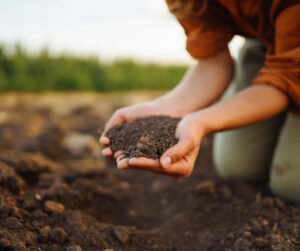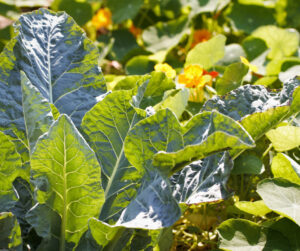Creating a thriving garden that not only sustains itself but also contributes to the broader ecosystem requires more than just sunlight and water. The secret to a successful, biodiverse, and highly productive garden lies beneath the surface – in the health of your soil. In this article, we’ll explore the crucial role of soil health in fostering biodiversity and ensuring the productivity of your garden.
Nutrient-rich soil nurtures healthy plants

Soil serves as the primary source of nutrients for plants. A well-balanced, nutrient-rich soil provides plants with the essential elements they need to grow and produce. Adequate levels of nitrogen, phosphorus, potassium, and other micronutrients are vital for plant health. When soil health is optimised, plants are better equipped to resist pests and diseases, resulting in a more robust and productive garden. For instance, adding compost or well-rotted manure can significantly enhance soil structure and fertility, providing a steady supply of nutrients to your plants. Regular soil testing can also help you identify nutrient deficiencies and address them promptly.
Microbial activity enhances soil fertility
Healthy soil is teeming with microbial life, including bacteria, fungi, and other microorganisms. These tiny organisms play a crucial role in breaking down organic matter, releasing nutrients, and improving soil structure. Beneficial microbes form symbiotic relationships with plant roots, aiding in nutrient absorption and disease prevention. To foster microbial activity, consider incorporating good quality amendments like compost tea or worm castings into your soil. These amendments boost microbial populations, enhancing nutrient cycling and soil fertility.
Soil structure affects water retention and drainage
A well-structured soil with a good balance of sand, silt, and clay particles allows for optimal water retention and drainage. Building soil organic matter through the addition of amendments such as compost and other organic materials to enhance soil structure, promote aeration and create an environment where plant roots can thrive. Mulching with organic materials such as straw or wood chips helps maintain soil moisture and temperature, and will also break down to build your soil up with organic matter. A good way to evaluate this soil quality is to simply test how long the water lasts after a good soaking. Does your soil hold onto water (nutrients and other resources) like a sponge?
Biodiversity in the soil supports plant diversity

The health of your garden extends beyond what meets the eye. A diverse community of soil-dwelling organisms contributes to a balanced ecosystem. Earthworms, insects, and other invertebrates aerate the soil, break down organic matter, and contribute to nutrient cycling. Encouraging biodiversity in your soil can be as simple as rotating crops, planting cover crops, and reducing tillage. These practices support a variety of soil organisms, which in turn support a wide range of plant species in your garden.
Reducing the need for chemical inputs
A robust soil ecosystem can naturally suppress pests and diseases, reducing the reliance on synthetic pesticides and fertilisers. When soil health is prioritised, the garden becomes more resilient, and the need for chemical interventions decreases. This not only benefits the environment but also promotes the long-term sustainability of your garden. For example, introducing beneficial insects or using natural pest control methods can complement the soil’s natural defenses, creating a healthier and more balanced garden ecosystem.
Conclusion
In the world of gardening, healthy soil is the unsung. By prioritising soil health, gardeners can create a self-sustaining ecosystem that fosters biodiversity, supports plant growth, and yields abundant harvests. Building soil health is an investment in the long-term vitality of your garden, offering benefits that extend far beyond the surface. So, dig in, nurture your soil, and watch as your garden flourishes.
Related Articles:
Cover Crops 101: The Key to Building Soil Health
Cover crops, also known as green manure, are plants grown primarily to benefit the soil rather than for harvest. These crops play a crucial role in…
Companion Planting
Heard about companion planting but don’t know what it is or where to start? This video explores how to use companion plants to improve the health…
Strawberries
I adore strawberries (Fragaria sp.), and one of my earliest memories is a birthday cake absolutely heaving under the weight of a sack full of home…
Climate Resilient Gardening
Introduction Gardeners in Australia are facing a race against time as they experience the growing impact of climate change in their own gardens. The…




